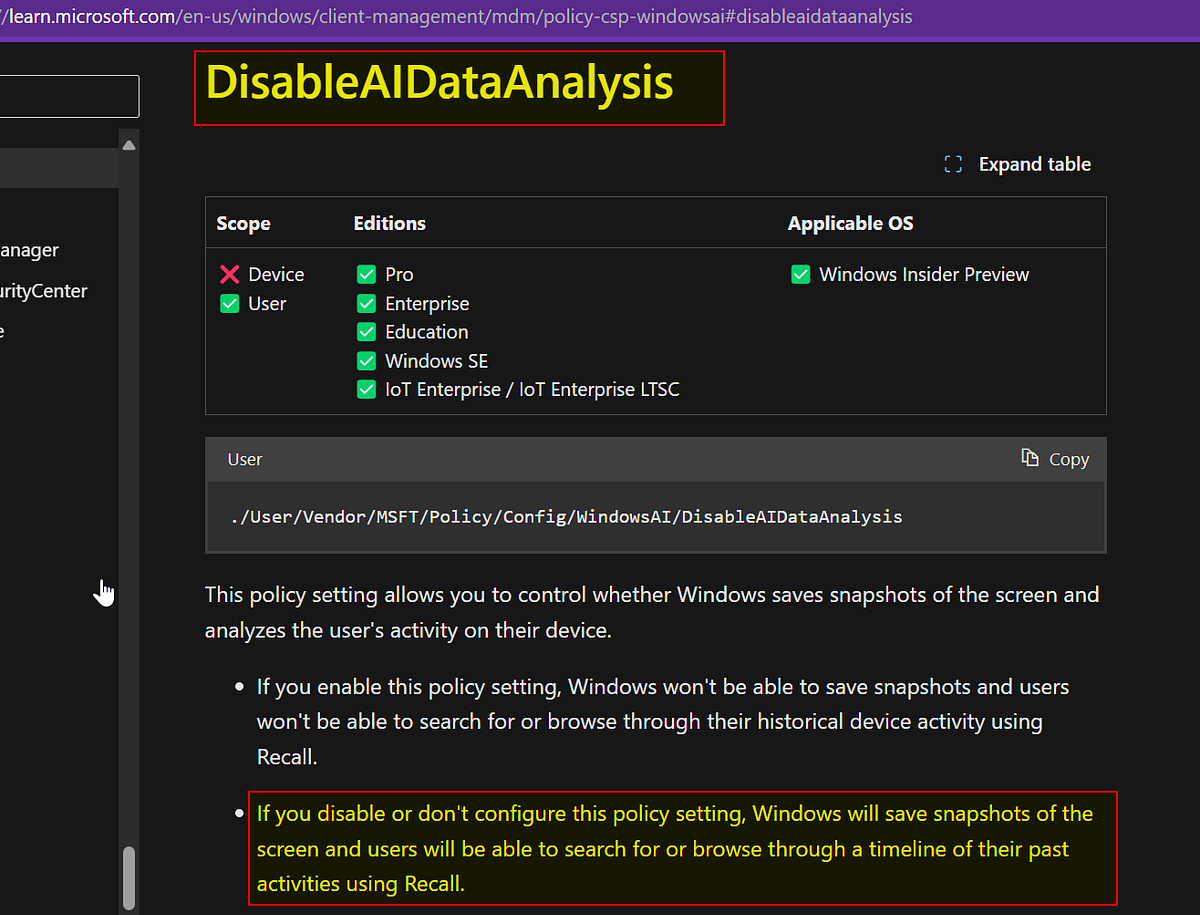Q. Is this really as harmful as you think?
A. Go to your parents house, your grandparents house etc and look at their Windows PC, look at the installed software in the past year, and try to use the device. Run some antivirus scans. There’s no way this implementation doesn’t end in tears — there’s a reason there’s a trillion dollar security industry, and that most problems revolve around malware and endpoints.



Unpopular Opinion: This is why Microsoft were such assholes about making sure Windows 11 required a modern TPM and this is also why they are forcefully rolling out Bitlocker encryption turned on by default on all Windows 11 PCs.
Is Recall still a fucking stupid idea? Yes, resoundingly so. But they’ve half-ass considered the risks, it seems. The forceful rollout of Bitlocker is dumb and short-sighted in its own right, and it wouldn’t make a person completely secure from outside attacks rooted in a Recall exposure.
Hardware controls are meaningless if an attacker gets you to click on a dodgy link in a phishing email or you fall for a social engineering scam when “Microsoft” calls you because your computer has a virus.
Theoretically, Microsoft could protect against most attacks. Apple has done it by making it increasingly impossible to touch kernel level stuff without an MDM. Every release they lock up more of the system. It means they are drifting toward iOS on their Macs, where the user doesn’t own their device, but it is an effective blocker to stuff like this, baring zero day kernel issues.
I think that is where Microsoft is headed, but they also aren’t able to let go of backward compatibility, so they really aren’t getting any closer to a system that is secured enough to handle such sensitive data.
Most compromises live in user space. Locking down the kernel is great and all but “most attacks” are running as the logged in user doing operations that user is permitted to do.
I am shocked there is even a single downvote on this comment. parent is 110% right. a kernel level compromise in the vast majority of exfiltration events its just needless (but nifty) icecream on top of the pain pie being served to the user.
Even on userland stuff Apple controls tightly. If they want to require a user to manually click, they will get that. If they want it to be a physical mouse and keyboard doing it, they will get that too. They own the device, and have complete control, not the user or “owner”.
Umm, no. Just…yeah, no.
The main problem with this theory is that Microsoft is absolutely abysmal at user end security, and they always have been. Frankly, they do not understand the issue.
But, more to the point, the whole TPM/secure boot stuff is a compromise; originally (I think this was about the time of Vista), they partnered with OEMs to have them include a DRM chip that made it literally impossible to install any non-windows OS on your laptop. They’ve managed to still get an implementation of TPM that makes switching your OS too confusing/difficult for the average user.
Anyway, bottom line is they only care about money, and they neither care or even understand the security needs of the end user.
And they’re gonna just enable it without asking if i want all my hard drives encrypted first?
Yes.
24h2 will explicitly be using it by default.
Nah dude. TPMs have always been about implementing DRMs. These companies hate that they can’t control our PCs, they want to be sure we can only run their approved apps. Like it works in iOS and (to a lesser degree for now) in Android. And even there they are pushing hard for even more restrictive DRM.
For example, some years ago I worked with a SaaS that implemented and sold some security products. One of our customers was a big retailer (for specialized products, not going into more details to avoid doxxing) that was having a problem with scalpers buying all their inventory as soon as they released it. So they were trying to put a show for regulators about stopping scalpers because their customers were complaining. We suggested that the only real solution was to have some real life verification of purchases. But in the end they went with the awful attestation APIs offered by Apple and Google to “fix” this. And in case you are not familiar, these APIs are just TPM based DRMs. So now, if you have a rooted/jailbroken phone you can’t even buy with this retailer anymore.
Note that this company wasn’t trying to fuck customers directly, they were just lazy and incentivised to not really fix the problem (a sale is a sale, even if to a scalper). But even then the end result is that their customers got their digital freedom rights restricted. It’s just a terrible technology IMO, the incentives from companies are all terrible. And that’s before we start considering the real intentions of awful companies like Microsoft, Apple and Google. IMO they are actually pushing for techno feudalism, but that’s my conspiracy theory hahaha.
So no, I doubt they were thinking about security with this recall bullshit. As other people have explained in their comments it doesn’t really protect much in practice. Plus this whole AI push has just been a stupid scramble from these companies to grab a big piece of the stupid AI pie from other companies hahaha, there is no long term plan here, don’t lie to yourself and us.
That’s not an unpopular opinion, it’s an outrageously stupid and uninformed one and you should keep it to yourself.